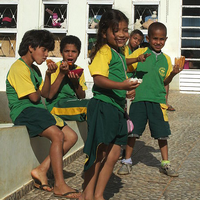Brazil's recent achievements in developing a sound economy, harnessing natural resources, lifting tens of thousands out of poverty and even landing the 2016 Olympic games has many convinced that its emergence as a world power is inevitable. But ongoing internal challenges, especially poor educational performance, may delay its rise. Outgoing President Luis Inácio Lula da Silva's obsession with immediate poverty alleviation and school attendance led him to overlook the underlying institutional and policy challenges facing Brazil's education system. And though President Dilma Rousseff's new administration has made strengthening that system a priority, it faces myriad bureaucratic, financial and policy obstacles along the way.
There is no question about Rousseff's commitment to education as a key to Brazil's success. During the presidential campaign, she often promised not only to maintain Lula's anti-poverty programs, but also to strengthen the country's critical, but lagging, elementary and secondary education systems.
Lula's failure to address these issues can be largely attributed to his personal background. With little formal education himself, he incessantly pitted himself against the educated elite and argued that the poor can achieve anything regardless of their level of education. In addition, Lula's preferred approach to education and poverty alleviation was immediate relief to the poor through programs such as Bolsa Família, which provides monthly cash stipends to families as long as their children attend school. While successful, Bolsa Família only provides temporary relief without addressing Brazilian education's underlying institutional and policy problems.

